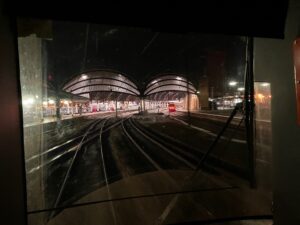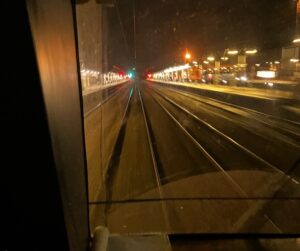Dan Richards remembers his friend, playwright Oliver Emanuel.

A mid December evening. The lights ahead are red. They flare in the streaked windscreen, three signals at danger, the tracks in front an infinite crimson V. The winter night is fuzzed with frost, the cold air is still, visibility clear.
A southbound express hammers past in a strobe of windows. Our train is dark, a shuttered ghost in the goods loop recently emerged from the Low Fell incline which we climbed with a dynamo whine. The Night Mail is quiet and coasting as we sidle up to the gantry, cab lit only by the glow of the round speedometer and the gantry glare outside, no point in rushing if we’re going to be held. Then the signal overhead winks to green with a white feather indicating that we’re cleared to swing left and join the fast lines. Faint judders tell of wheels slipping on icy rails below, a touch of power, then we sway towards the Up Main, snaking across two sets of points, one, two. Once the coaches behind clear the junction, our speed increases. The lights ahead are green. We accelerate into the dark. The inky unlit sections between stations and crossings are soothing, calm stretches where we seem to glide silent as an owl arrowing into the night, your eyes adjust, but then Chester-le-Street explodes, followed by Durham, four minutes later: a distant blaze which rushes up then bursts apart as a flood-lit firework of flashing platforms, painted lines, signage, canopy columns, fluorescing tracks, then darkness. Snapped back into the night, the close roar of the station replaced by the airy vault of a viaduct, the tracks before us curve into deep space. To our left Durham Cathedral towers amber. Ahead, the line scythes green.
Break lights fading in our wake, we race on – a red crested 25,000 volt comet full of Christmas post.
Four hours til London.
* * * * *
‘Take pictures then come and tell me all about it’ my friend Olly told me when I’d explained the plan: overnight on a mail train. ‘Amazing’ he said, in his hearty Olly-ish way. ‘Brilliant, you’ll be great at that.’ I remember being buoyed up by his immediate enthusiasm and half-wondering how somebody could be bad at riding up front in a train – annoy the driver? Pull the emergency cord? Slag off Brunel?
‘I’ll come back and tell you all about it’, I assured him.
‘Excellent’ he beamed. ‘Have fun.’
Olly was a playwright, a poet and dear friend – endlessly inquisitive, encouraging and funny. We met at Gladstone’s Library, got on, stayed in touch. I listened to some of his plays on the radio and was really impressed – not only by the stories they told but the way he used radio as a means of communication. His work was immersive, questing, humane and deeply strange. He did a lot adaptations – Max Porter’s Lanny, Nabokov’s Pale Fire, a triptych of Emile Zolas… he ran towards challenges, worked hard, taught at St Andrews, always had something on, always had a good word to say – turn out to support folk at Scottish book events, stay for a beer after, catch the late bus home.
When he had his first seizure I went to Kinross to see him.

‘I got on a coach to come here and I hate coaches, Olly. You better be ill’, I told him. Turned out he was. Grade 4 brain cancer. The same thing that killed Benjamin Zephaniah. He wouldn’t mind me telling you this, I’m sure. He wouldn’t mind me telling the story as long as I tell it well. So I’ve started with the impressionistic mail train bit to set the scene (‘Love it.’) then had a bit of dialogue and introduced you (‘You didn’t mention the theatre stuff.’) No, but I’m going to later (‘Brilliant. Carry on.’)
So we started meeting up in Kinross every so often to walk by Loch Leven and talk about writing. One of the first things that happened to Olly was that he lost the ability to read. I’d read him bits of my stuff and he’d listen and give useful insightful encouraging notes. In the moment when his brain fog cleared he managed to write a manuscript about the experience of living with an astrocytoma and the stripping away of his ability to read, write, and communicate. He did fantastically well but he began to get tired. He never grew bitter that I saw but he had less reserves as the months went on. Biopsies were problematic and needed repeating, treatment was onerous and turned out not to work. The medication changed his body, made him swell up. Physically he was fine but he’d cancer in his brain and it became clear pretty quickly that he wouldn’t survive it. He was 43.
At one point we planned to travel down to the National Railway Museum in York but by that point he hadn’t the energy to travel. I sent him photographs of locomotives in the great hall and the travelling post office (TPO) carriage that I was researching. ‘Love it,’ he said. ‘Tremendous. Show me more things.’
And I thought of that as we beetled through York on the mail train. I really wished you’d been there but took pictures so I could show you. You’d have made so much of it, had an ear out for the atmospherics, Keith the driver’s turn of phrase, the way he detailed the route as we flew through the night, the dream-like quality of the trip. You could have done so much with it.
When I got back to Scotland you were in hospital which was a new and unwelcome development, at least for me, because I didn’t like to think of you there. But it was best for you and family, and everyone in Dundee was great, you said later – but by that point you’d been moved to Perth for palliative care.

I went to see you and you were a radio between stations, fading in, fading out, and I suddenly realised why the voice-notes by which we’d stayed in touch all these months had begun to remain grey-ticked, unseen; you were so so tired. Everything was exhausting – but then you’d be back and we’d have a good minute. ‘Can you make coffee?’ Of course I can, Olly. ‘Make us a coffee and then we’ll talk.’ I made coffee and returned. Did it taste alright? ‘Doesn’t matter, mate, tell me about your adventures.’
Towards the end of my grandfather’s life, I began to record him talking about the railways, his days on the TPO. His stories didn’t always hang together but the record of his time on the trains is something I treasure. (‘Very good, very good.’) Well he was 90 something when he died. Much older than you. (‘Older than everyone.’) Yeah, I think it felt so for him. But his days on the trains were the time of his life and I think that was theatre for you. Do you know? (‘Yeah, I see it. Very clever.’) And his life drifted away from his glory days but you were still in it and at it and good right til the end… and this is so very sad for us all now, Olly, because you’re still here with me as I write this tonight. I can hear you so strongly and see you – not there; not as it we left it, maybe by the loch. Or the coffee place in Kinross where they knew you. (‘Best customer, you see.’)
I want to remember and celebrate you and your life, and the fact that you’re gone is unreal, so wrong, and nothing to do with who you were and are to us, your friends, your readers, your audience. The way you lived is what remains. The way you lived and the things you did and your voice is so strong to me in my memory and in your work. Your voice is you and so you’re still here and I won’t tell the story the way you would have done it but I want you to know that you’ll always be in what I do. I’ll always hear your voice and think ‘What would Olly think?’ (‘Like Lewis after Inspector Morse?’) No. Not like that. (‘Whyaye there’s been a murder leek’) Not like that no, you’re spoiling it now. (‘Big ending, gotcha’) Well something like ‘Thanks.’ (‘That it?’) I think so. I wish you were here. (‘Not dead.’) Not dead. And thanks for all you were. I love you so much. We all did. You were great.
And in my head he says ‘Thanks, mate. All love to you. Take care.’ And if this whole piece seems weird and absurd then yes, I agree, but so is him not being here… and what can you do? You carry on. Tell stories. Drink coffee. Hold people dear.
Go well, Olly.
All my love.
Dan

*
Read Oliver Emanuel’s obituary in the The Guardian here.